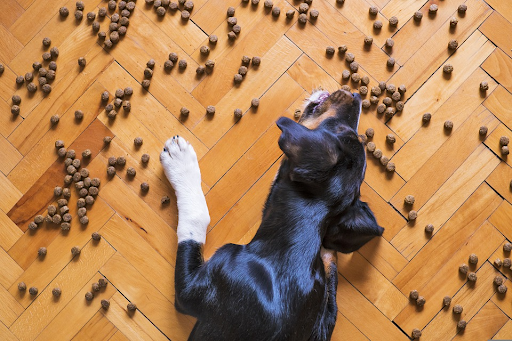You probably already know dogs love to devour just about any food they get their paws on. While some dogs can digest any kind of food, others have a more sensitive digestive system.
Knowing how long it takes dogs to digest food, regardless of which category your dog falls in can be helpful.
Most dog owners have very limited knowledge about the digestive process of their dogs.
In this article, we will look at how long a dog takes to digest food, the digestive process in a dog, factors that influence the digestive speed in a dog, and more. Let’s dive in.
How Long Does It Take for Dogs to Digest Food?

Several factors determine the time it takes for a dog to digest its food. Keeping this in mind, small dogs take longer to digest their food than larger dogs, and digestion in a giant dog can take up to 8 hours. Conversely, puppies digest food faster than adult dogs.
Digestive Process in a Dog
Several events occur between the time your dog takes in food from their bowl and the time they pass it out as poop.
The entire process of digestion along the gastrointestinal tract is necessary to ensure your dog gets all the required nutrients from the food they eat.
Mouth
Digestion begins as soon as your dog takes in food and starts to chew. The food is crushed into small pieces by the teeth, coming down into the esophagus and the stomach.
Stomach
When those food pieces arrive in the stomach, the food undergoes digestion by enzymes, and the acid in the stomach is called hydrochloric acid. Those enzymes break the food down into absorbable nutrient components.
Small Intestine
After digestion in the stomach, the food moves into the small intestine, and the intestinal walls absorb the vital nutrients and water into the bloodstream. In addition, more enzymes from organs like the pancreas and liver aid this digestion process.
Large Intestine
Finally, any undigested food or waste product that remains after nutrient absorption changes into feces in the large intestine. And eventually, your dog would pass the feces out as stool.
What Happens to the Undigested Food?
Not all food consumed by your dog gets absorbed by the body. After food gets broken down, the essential nutrients required by your dog get absorbed through the intestines, and fiber is left, alongside bacteria, organic matter, and water.
You’ll likely notice food particles in your dog’s stool if you feed your dog raw food like vegetables.
Seeing such particles in your dog’s feces doesn’t mean it hasn’t derived nutrients from consuming the veggies; it means that the digestive tract has absorbed the needed nutrients, and the fiber your dog cannot digest has left the body as feces.
Fiber is vital in maintaining a healthy digestive system, as it helps control the water content of feces. Fiber is also an essential part of keeping the digestive system healthy, as it helps regulate the water content of stool.
Factors that Determine How Long a Dog Takes to Digest food

Certain factors influence how fast a dog digests consumed food, and they include:
Breed and Size
According to research, digestive sensitivity is relative to the dog’s size. The speed of digestion of a full-grown Anatolian Shepherd that weighs 110–150 pounds wouldn’t be the same as that of a Yorkshire Terrier that weighs only 7 pounds. However, scientists have produced different results after studying other breeds.
Age

All things being equal, an old dog would pass out feces less frequently, and a younger dog would pass out feces more. The same goes for their metabolism rate: Older dogs have a slower metabolism rate than young puppies.
Diet
To make sure that the digestive cycle of your puppy stays balanced, it is suggested that you feed your dog food specially formulated for dogs, and be sure that the food is relevant to its age. Food high in protein but minimal grains is one of the healthiest options for dogs that aren’t old.
The nutritional needs of a puppy dog differ from that of a small and large breed dog. Feeding puppies puppy formula or an all-life stage food is the best option. Whereas for older dogs, it is suggested to feed them meals rich in calcium, protein, fatty acids, etc.
If you are still confused about your dog’s diet, ask your vet to give you some options. Keep in mind that feeding raw meat to dogs poses a risk of food poisoning and various other digestion-related issues.
Gut Microbiome
The microbiome is a bacteria that lives in a dog’s digestive system. This organism isn’t harmful. In fact, it helps the dog in many ways.
Microbiome aids digestion, offers protection against nasty bugs, and boosts immunity. A healthy dosage of this bacteria can enhance digestion by helping speed up the food breakdown process.
Bacteria and Dog Food

It is vital to support your dog’s digestion by adding the right amount of bacteria to their food. Prebiotics and probiotics are excellent ways to start, and they often come as food items, pills, or in powder form.
Serving prebiotics and probiotics when it’s already in reasonable quantity in the food will make the digestion too fast.
This can be harmful to your dog and can result in grumbling and starvation. Therefore, it is essential to make sure that you feed the bacteria to your dog while keeping in mind the type of diet your dog consumes.
Diseases And Health Conditions
Digestive Health, overall health, and the immune system are all closely connected. If your dog is underweight or overweight or has any health issues, it can affect digestion and absorption of nutrients.
Malabsorption diseases like exocrine pancreatic insufficiency (EPI) and inflammatory bowel disease ( IBD) can affect canine digestion. Other digestive problems include cancer, colitis, gastritis, parvovirus, and intestinal blockage.
Exercise

You should never undervalue the role that walks play in assisting your dog’s digestion of food.
In addition to helping a dog maintain excellent health and stay in shape, increasing the amount of energy that a dog expends helps increase the pace at which that dog digests food.
This way, the meal is digested more quickly, producing caloric energy, which is used to boost their power. Constipation can also be avoided by exercising.
Regular exercise helps control how your dog’s food affects its stomach and also helps prevent constipation. According to experts, the ideal amount of daily activity for an adult dog should be anything from thirty minutes to two hours.
Hydration
Water plays a big role in the process of digestion. A dog’s body requires about one ounce of water per pound of body weight. So, make sure your dog has access to clean water every day.
Make sure you change your dog’s water every 3-4 hours, as dogs try to avoid drinking water if it’s dirty or smelly. To make them drink more water, you can try adding sliced veggies, leafy greens, or blueberries to its water bowl.
A Stress-Free Environment

Humans are very similar to dogs, and just like anxiousness may alter your bowel movement and make you not have an appetite or constipate, the same can happen to dogs.
Watch for body language like whining, barking, or staying alone too much. This occurrence could be a sign of a stressful environment.
Among other things that can make a dog feel stressed is a traumatic event to either your life or their own life, Illness, or the fact that you’re always leaving early and returning late (which could lead to thoughts of separation).
All these signs can further lead to depression, resulting in loss of appetite and digestion issues.
Summing Up
There is no straightforward answer to the question, “how long does it take a dog to digest food”?
In most cases, it takes four hours or somewhat longer for pups, but it can take anywhere from eight to twelve hours for bigger dogs. This time depends on whether or not all other factors, such as sickness, stress, food, physical activity, and so on, are equal.

